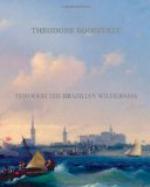We took breakfast—the eleven-o’clock Brazilian breakfast—on Colonel Rondon’s boat. Caymans were becoming more plentiful. The ugly brutes lay on the sand-flats and mud-banks like logs, always with the head raised, sometimes with the jaws open. They are often dangerous to domestic animals, and are always destructive to fish, and it is good to shoot them. I killed half a dozen, and missed nearly as many more— a throbbing boat does not improve one’s aim. We passed forests of palms that extended for leagues, and vast marshy meadows, where storks, herons, and ibis were gathered, with flocks of cormorants and darters on the sand-bars, and stilts, skimmers, and clouds of beautiful swaying terns in the foreground. About noon we passed the highest point which the old Spanish conquistadores and explorers, Irala and Ayolas, had reached in the course of their marvellous journeys in the first half of the sixteenth century—at a time when there was not a settlement in what is now the United States, and when hardly a single English sea captain had ventured so much as to cross the Atlantic.
By the following day the country on the east bank had become a vast marshy plain dotted here and there by tree-clad patches of higher land. The morning was rainy; a contrast to the fine weather we had hitherto encountered. We passed wood-yards and cattle-ranches. At one of the latter the owner, an Argentine of Irish parentage, who still spoke English with the accent of the land of his parents’ nativity, remarked




